|
|
|
Sort Order |
|
|
|
Items / Page
|
|
|
|
|
|
|
| Srl | Item |
| 1 |
ID:
169889
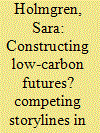

|
|
|
|
|
| Summary/Abstract |
This study examines how the European Union (EU) energy policy goals are translated in Estonia, a country heavily reliant on fossil fuel oil shale and having one of the most energy-intensive economies in the EU. Drawing on Hajer's approach to discourse and different qualitative methods, we analyse the production of different low-carbon storylines. Our findings show that state and industrial actors accommodate environmentally damaging oil shale production in low-carbon energy transformation, despite good conditions for expanding renewable energy. Additionally, they limit their ambition to transform mere technological modifications to the minimum requirements of the EU GHG emission reduction target. The socio-economic conditions of workers and people living near oil shale mining areas, primarily Estonian Russians, are a critical factor in upholding oil shale as a necessity. Despite being at the centre of dominant storylines, these people are portrayed as a category that needs to be kept at ease, rather than actively engaged in constructing acceptable sustainable routes to low-carbon futures. We conclude that in order to accelerate the decarbonisation in Estonia and beyond, and unleashing the transformative potential of EU energy policy, it is vital to make marginalised voices heard and engaged in energy policy decision-making.
|
|
|
|
|
|
|
|
|
|
|
|
|
|
|
|
| 2 |
ID:
162954
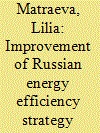

|
|
|
|
|
| Summary/Abstract |
Analysis of Russian energy saving potential and experience of implementation of energy efficiency policy in Russia at the present stage showed that the domestic economy has considerable potential energy savings, but their implementation requires intensifying the activities of the State in this area, particularly with regard to overcoming the identified reasons for the low efficiency of national economy. Government activities in the field of energy saving and energy efficiency in Russia was initiated in 2008 and a significant legal and regulatory framework was developed as a basis for it, however, despite the positive examples, the objectives set for energy intensity reduction are not being met, and the overall level of implementation of government interventions in energy efficiency in industries is insufficient. This paper proposes the author's approach to Russian energy efficiency strategy, which, based on international experience, sets out priorities for improving the energy efficiency policies.
|
|
|
|
|
|
|
|
|
|
|
|
|
|
|
|
| 3 |
ID:
162307
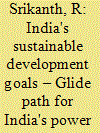

|
|
|
|
|
| Summary/Abstract |
India has adopted the 2030 Agenda during the United Nations Summit held in September 2015. Energy is intimately connected with 74% of the 169 targets related to the 17 Sustainable Development Goals (SDGs) to be achieved by 2030. Subsequently, India has also submitted its Nationally Determined Contributions (NDCs) for the period 2021–2030 to the United Nations Framework Convention on Climate Change (UNFCCC). While the Government of India (GOI) has ambitious plans for enhancing the installed capacity of RE sources, 75% of its electricity is currently generated by coal-fired power plants. As India's electricity requirements grow to meet the aspirations of 1.3 Bi people, it needs a policy framework that integrates all low-carbon energy technologies with coal in such a manner that the reliability, security, and affordability of electric supply are balanced with sustainable development. India also needs to develop innovative strategies to clean up the country's coal sector while enhancing the integration of renewable energy into the National Power Grid. In this context, certain recommendations are proposed in this article for timely implementation by GOI to facilitate the achievement of India's targets with respect to SDG 7 and the NDCs in an efficient and effective manner.
|
|
|
|
|
|
|
|
|
|
|
|
|
|
|
|
| 4 |
ID:
149449
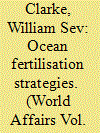

|
|
|
|
|
| Summary/Abstract |
Ocean fertilisation has been identified as one of the few methods by which catastrophic global warming and ocean acidification may be averted. One proposal involves the novel concept of using buoyant, long-lasting flakes to deliver lacking nutrients to potentially productive surface waters. According to William Sev Clarke, this method could restore oceanic and atmospheric carbon levels to pre-industrial ones, provide time for a managed transition to a low-carbon economy and stimulate global economic development.
|
|
|
|
|
|
|
|
|
|
|
|
|
|
|
|
| 5 |
ID:
180091


|
|
|
|
|
| Summary/Abstract |
Canadian hydropower resources offer a potentially attractive option for meeting decarbonization targets in the US Northeast region, where there are ambitious climate goals and nearby hydro resources in Quebec. Existing transmission capacity is, however, a limiting factor in expanding hydropower imports to the region. To examine the value of expanding transmission capacity from Quebec to the Northeast, we employ an integrated top-down bottom-up modeling framework (USREP-EleMod). This research was part of an Energy Modeling Forum effort, EMF34, with a goal of better characterizing linkages in energy markets across North America. The scenarios we examine exogenously expand transmission capacity by 10, 30, and 50% above existing capacity into the US Northeast (New York/New England), finding the value to the economy of these expansions ranging from $.38-$.49 per kWh imported into New York, and $.30-$.33 per kWh imported into New England by 2050. The scenarios include economy-wide emissions goals these states have set for themselves. The carbon limits we imposed raise fuel prices more than electricity prices and as a result we found greater electrification in the US Northeast region from 2030 onward, a result that one would not see using just an electricity sector model, demonstrating a main hypothesis of EMF34, that models that looked at more integration across energy markets would give deeper insight than more narrowly focused models.
|
|
|
|
|
|
|
|
|
|
|
|
|
|
|
|
| 6 |
ID:
105161
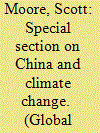

|
|
|
|
|
| Publication |
2011.
|
| Summary/Abstract |
China's policy related to climate change is a complex and seemingly contradictory amalgam of initiatives across a range of policy areas. Nonetheless, a nuanced understanding of China's stance on climate change is necessary to understand the process of international climate negotiations. This article seeks to clarify and expand understanding of China's climate policy through an analysis of how specific aspects of climate policy relate to the core interests of the Chinese Communist Party. Climate change presents both threats and opportunities to these interests, and it is chiefly the calculus of threat and interest which guides China's policy on climate change.
|
|
|
|
|
|
|
|
|
|
|
|
|
|
|
|
| 7 |
ID:
176858
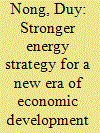

|
|
|
|
|
| Summary/Abstract |
Energy security has been a major concern in developing countries because of rapid economic development and population growth, low power generation capacity, and unwell-developed transmission infrastructure. Vietnam in this context has been under energy security threats for more than a decade and is currently having a new power policy to strongly develop power generation and distribution networks. It is expected that the country's economy is able to develop substantially due to massively additional energy supply once completing the plants and distribution networks but the likely impacts are still undefined. This paper extends an economic electricity-detailed model to examine the potential impacts of such a new power policy in Vietnam. We find that the policy will decrease the prices of both fossil-based and renewable-based electricity significantly by 40%–78% under a 2030 target scenario, benefiting all sectors in the economy to substitute for fossil fuels. Households are particularly benefited as evidenced by 5.64%–19.19% increases in per-capita utility. Overall, the Vietnamese economy is significantly advantaged with real GDP increasing by 5.44%–24.83% over different scenarios, which are much higher than the findings in other countries. More importantly, the policy moves the country to a low-carbon energy structure in the near future.
|
|
|
|
|
|
|
|
|
|
|
|
|
|
|
|
|
|
|
|
|